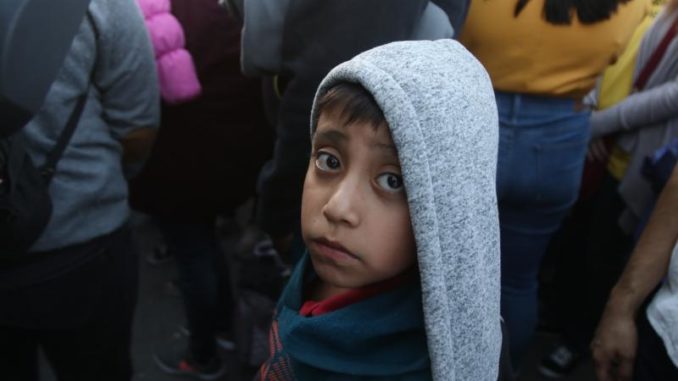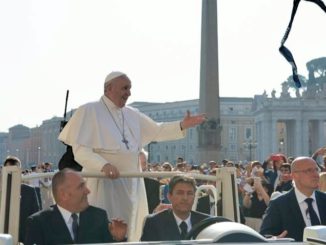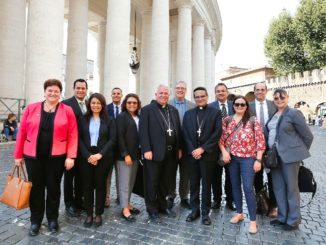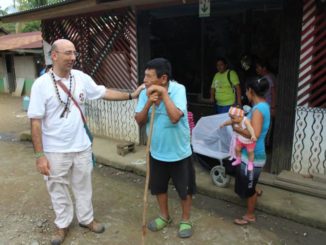
EL PASO, Texas—Del 11 al 13 de octubre, organizadores latinos católicos, líderes sindicales, académicos y activistas participaron en El Paso en un evento de justicia social que fue una combinación de enseñanza y demanda de acción.
La reunión, a la que asistieron unas 300 personas, fue patrocinada por un grupo de reciente constitución llamado Coalición Latina de Liderazgo Católico (Latinx Catholic Leadership Coalition), en colaboración con El Instituto Fronterizo Esperanza (Hope Border Institute). Los organizadores dijeron que el evento fue una respuesta al “tratamiento inhumano de migrantes y refugiados en la frontera” y el tiroteo en El Paso del verano pasado, que las autoridades creen haber estado dirigido contra Latinos.
El evento incluyó talleres, entrenamientos, sesiones de estrategia y una acción pública en la que los participantes cruzaron el Puente Internacional Lerdo desde El Paso a Ciudad Juárez, México, para visitar a solicitantes de asilo el 12 de octubre.
La sesión inicial del 11 de octubre tenía como tema: “Nuestras comunidades atacadas: minar la supremacía blanca por medio de la solidaridad”, y fue presentado por Monseñor Arturo Bañuelas, párroco de la iglesia de San Marcos el El Paso.
La sesión de clausura del 13 de octubre fue sobre el liderazgo latino en el momento presente, dirigida por Luis Fraga, director del Institute for Latino Studies de la Universidad de Notre Dame.
Al final de la reunión de tres días, el obispo Mark J. Seitz de El Paso publicó una carta pastoral titulada “Ya no habrá noche” y firmó copias de la carta para algunos de los asistentes al acontecimiento en la frontera.
La carta pastoral habló del papel de la iglesia en el racismo de la frontera, especialmente entre las comunidades indígenas, y también describió el dolor de los latinos en El Paso inmediatamente después del tiroteo en el Walmart en agosto.
El obispo dijo que el tiroteo, que resultó en la muerte de 22 personas, fue un ejemplo del racismo contra latinos, que ha llegado a un nivel peligroso en la nación.
Al final de la carta, el obispo Seitz urgió al presidente Donald Trump, al Congreso y a la Corte Suprema a “escuchar la voz de la conciencia y frenar en seco la deportación de quienes no representan un peligro para nuestras comunidades, parar la separación de familias, y poner fin de una vez por todas al rechazo de los refugiados y a la muerte en la frontera”.
Immigration advocates take part in teach-in event at U.S.-Mexico border
EL PASO, Texas—Catholic Latino organizers, labor leaders, scholars and activists took part in a social justice event that was a combination teach-in and demand for action Oct. 11-13 in El Paso.
The gathering, attended by about 300 people, was sponsored by a newly formed group called Latinx Catholic Leadership Coalition in collaboration with the Hope Border Institute. Organizers said the event was in response to the “inhumane treatment of migrants and refugees at the border” and the El Paso shooting that authorities believe targeted Latinos this past summer.
The event included workshops, training, strategizing sessions and a public action where participants walked across the Lerdo International Bridge from El Paso to Ciudad Juarez, Mexico, to visit asylum-seekers Oct. 12.
The opening session Oct. 11 had as its theme: “Our communities are under attack: undermining white supremacy through solidarity” and had as its presenter Msgr. Arturo Banuelas, pastor of St. Mark’s Church in El Paso.
The closing session Oct. 13 was about Latino leadership for the present moment led by Luis Fraga, director of the Institute for Latino Studies at the University of Notre Dame.
At the end of the three-day gathering, Bishop Mark J. Seitz of El Paso released a pastoral letter titled “Night Will Be No More” and signed copies of the letter for some of those attending the border event.
The pastoral letter spoke about the church’s role in racism at the border, particularly among indigenous communities and also described the pain of Latinos in the El Paso area following the mass shooting at the Walmart in August.
The bishop said the shooting, which killed 22 people, was an example of the racism toward Latinos that has reached “a dangerous fever pitch” in the nation
At the end of the letter, Bishop Seitz urged President Donald Trump, Congress and the Supreme Court to “listen to the voice of conscience and halt the deportation of all those who are not a danger to our communities, to stop the separation of families, and to end once and for all the turning back of refugees and death at the border.”



